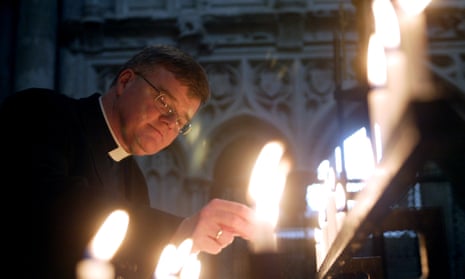What makes churches fail? Obviously the answer has very little to do with the historical truth of scripture, or else there would be no Mormons, Muslims, Christians or Jews. But one very popular answer is that it has to do with a lack of conviction. On this theory, it doesn’t matter what you believe, so long as you are firm and unyielding in the way that you believe it. The popular tabloid formulation of this was to ask what would happen if the trumpet gave an uncertain sound, but since this is a biblical quotation, it has rather lost its force.
That would certainly account for the success of obvious charlatans like the prosperity gospel preachers. On the other hand, few people could be more firm and unyielding in their beliefs than hardline Calvinists, and they have just about disappeared from most parts of the world. It’s no use being consistently convinced that you are right when you’re both wrong and boring.
But there is one form of the “uncertain trumpet” argument that retains currency, and that’s the belief that any church which compromises on modern sexual mores is doomed. In the Catholic church, this takes the form of arguing that any relaxation of the hard line on remarriage after divorce, or even contraception, will automatically plunge the church into the abyss into which liberal protestantism has disappeared. There is a flaw in that argument, of course, which is that 30 years of maintaining the hard line under John Paul II and Benedict XVI did absolutely nothing to stem the decline of the Catholic church in the west. If ex-Catholics made up a denomination of their own, they would be the second largest religious grouping in the USA, and almost all of them have fled with hands over their ears from a church which was blowing its own trumpet with deafening certainty.
The Church of England has its own version of this argument, which goes back to the unbelieving Bishop of Durham, a figure of legendary horror to evangelicals. This man, identified by historians as the Right Rev David Jenkins, was widely supposed to believe nothing at all of traditional Christianity, despite being the fifth most senior bishop in the hierarchy. He certainly did not believe in the virgin birth, nor in the bodily resurrection. Neither, of course, do most churchgoers. It was an article of faith among conservatives, though, that churchgoers required a bishop who would believe all the things they could not themselves suppose were true, and he was succeeded by a succession of men of unimpeachable orthodoxy. Under their stewardship, church attendance in the diocese declined by 36% in 20 years.
Last week I was talking to a man who has some influence over the choice of bishops in the Church of England, and he said confidently that Dr Jeffrey John, the gay dean of St Albans, could never be a bishop because he could not function as a focus of unity in the diocese. In every part of the country, there are noisy and assertive evangelical groups who would make a production of marching out of the Church of England if he were appointed a bishop.
It may be true that some will react like that. What’s wrong with this argument is not that it’s cowardly, so much as that it is stupid. It mistakes visibility for significance. The implicit assumption is that clergy who leave the church (and it is almost always clergy) on points of theological principle, and who announce that they are doing so, are somehow more real than all the more numerous laity who just quietly disappear without saying anything. None of the endlessly trumpeted schisms in the Church of England, over sexuality or gender, or anything else, have resulted in the loss of anything like a third of the church – yet that is what the completely orthodox boredom of the bench of bishops has managed over the last 30 years.
Churches are imaginative constructs, and so there’s nothing that destroys them more quickly than indifference. They are also supposed to be concerned with stuff that really matters. A pompous and complacent bishop, chosen because they tick all the boxes, can only be a focus for pomp and complacency. Give me a focus for disunity any day. He will not drive half as many worshippers away.

